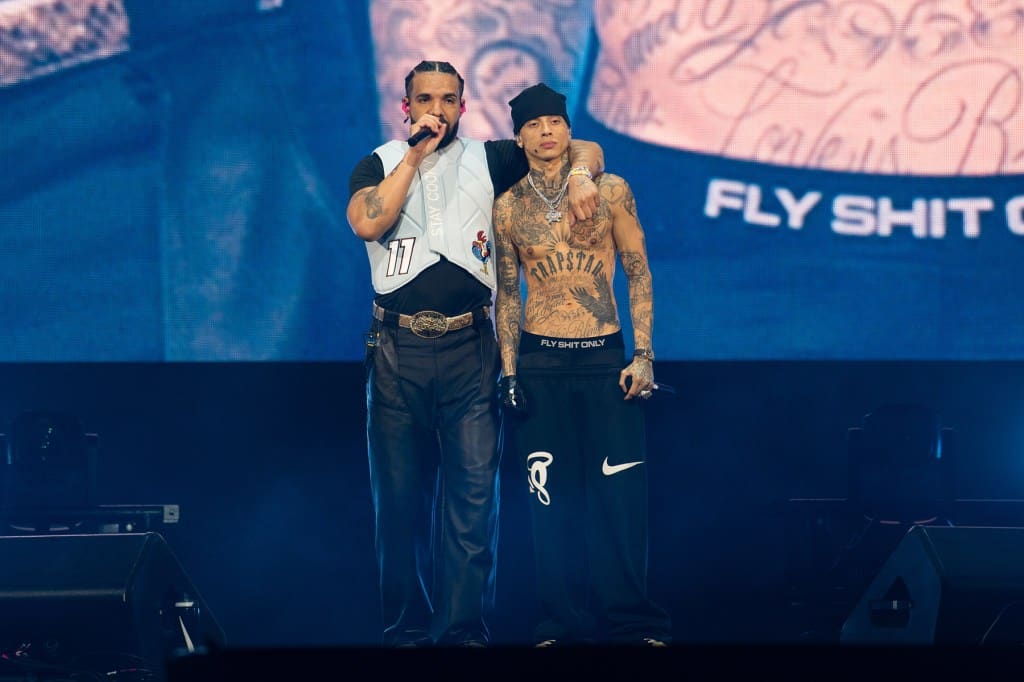Blog
Page: 8
Trending on Billboard
Key Investment Group (KIG) is asking a federal judge to throw out a recently filed Federal Trade Commission (FTC) lawsuit against the ticket resale company over alleged violations of the Better Online Ticket Sales (BOTS) Act.
In August, the FTC filed suit against KIG, alleging the company violated the BOTS Act when it purchased thousands of Taylor Swift tickets for her 2023-2024 Eras Tour and resold them for more than $1 million in profit. The lawsuit was filed days before a similar complaint was filed against Ticketmaster for allegedly refusing to enforce its own rules against scalpers and allowing unrestricted resale on its platform. Since then, Ticketmaster has made changes to its resale policies and, like KIG, has argued that the FTC is misapplying the BOTS Act.
Related
The FTC sued KIG in August, alleging the Colorado-based ticket resale operation used networks of accounts, IP masking, SIM boxes and other technical tools to evade Ticketmaster’s ticket-purchasing limits and acquire hundreds of high-demand tickets for resale. The agency claims these tactics “circumvented” the ticketing giant’s security controls in violation of the BOTS Act.
KIG is the first of the two firms to file a motion to dismiss. In a sweeping 36-page missive filed on Nov. 24, KIG attorney Bezalel A. Stern with law firm Manatt, Phelps and Phillips argues that the FTC’s complaint attempts to regulate long-established broker practices — like using multiple IP addresses to buy tickets or operating dozens of Ticketmaster accounts — that do not involve bots.
“KIG does not use bots. KIG does not circumvent any security measure,” the company tells the court, arguing the FTC is attempting to impose an unprecedented interpretation of the law that contradicts the law’s legislative history and the FTC’s own prior guidance.
Related
Stern stresses that the BOTS Act was explicitly drafted to stop “malicious computer code” that lets bot operators overwhelm ticketing websites and jump ahead of human buyers. KIG argues that since it employs human buyers — not automated scripts — the law does not apply. “Without the use of bots, there can be no BOTS Act violation,” KIG claims in the filing.
KIG’s brief also turns the FTC’s own evidence against it. In its lawsuit, the FTC included Ticketmaster records showing the ticketing company tracked KIG’s accounts and purchasing practices — even those created under alternate names — and knowingly allowed them. In a 2024 Ticketmaster email cited by the FTC, a Ticketmaster representative tells KIG that purchases made across different accounts are “within guidelines” so long as each individual account respects the posted per-account ticket limit. KIG’s motion argues that email destroys the FTC’s theory of unlawful “circumvention,” because ticket brokers at KIG cannot “avoid,” “evade” or “deceive” Ticketmaster’s controls when Ticketmaster explicitly authorizes the behavior.
KIG also highlights a contradiction between the FTC’s case against it and the agency’s separate September lawsuit against Ticketmaster and Live Nation. In that parallel case, the FTC alleges the ticketing company “knowingly allows, and in fact encourages, brokers to use multiple Ticketmaster accounts.” KIG argues the FTC cannot simultaneously claim Ticketmaster encourages multi-account purchasing while accusing KIG of “circumventing” the very same rules.
Related
The filing emphasizes that the FTC never alleges that KIG purchased tickets “within seconds” or at speeds indicative of automated software — the hallmark of bot activity described in past enforcement cases. According to KIG, the FTC is trying to convert everyday reseller practices into federal violations simply because they involve scale.
The FTC’s cited evidence — including a bank audit, news reports and previous consent decrees involving actual bot operators — does not establish that KIG knew its conduct was illegal under the BOTS Act, KIG’s motion claims.
Elsewhere in the motion, KIG alleges that the case began with a politically charged push by the White House to crack down on scalping. The company notes that minutes after President Trump — joined by Kid Rock — signed a March 2025 executive order demanding aggressive enforcement of the BOTS Act, the FTC sent KIG a draft complaint threatening litigation unless the company admitted wrongdoing.
KIG says the agency is now “expanding the BOTS Act far beyond its written and intended scope,” and warns that if the FTC’s theory were adopted, “every person or company who purchases tickets using more than one account” could be accused of violating federal law.
U.S. District Judge George L. Russell III will now consider the motion and whether to dismiss the government’s case before discovery begins. If not, the FTC will proceed to try to prove that KIG’s coordinated multi-account strategy amounted to illegal bot-level activity.
Trending on Billboard
Sombr, Geese and Sasha Keable are among the artists to feature on the BBC Radio 1’s Sound of 2026 longlist published Monday (Dec. 1).
The annual list is described by the BBC as spotlighting “ten exciting new artists tipped for success next year” and has become “a trusted marker of future success.” Chappell Roan was the most recent victor of the Sound Of prize in 2025.
Joining the aforementioned trio is Alessi Rose, Chloe Qisha, Florence Road, Jim Legxacy, kwn, Royel Otis, and Skye Newman. The top five from the list will be announced from Jan. 5, 2026 onwards, culminating in the winner on Jan. 9.
The shortlist and winner is compiled and selected by over 170 U.K. music industry professionals and artists including Elton John, Dua Lipa, JADE, Olivia Dean, YUNGBLUD and Sam Smith.
Sound Of was established in 2003 and has become a crucial part of the U.K. music industry’s tips season. Adele, Lady Gaga, RAYE, The Weeknd, Dua Lipa, Billie Eilish and Lewis Capaldi are among the artists to appear on the list over its history. Recent winners have included The Last Dinner Party (2024), FLO (2023), PinkPantheress (2022), Pa Salieu (2021) and Celeste (2020).
For the 2026 edition, eligible artists must not have had more than three top 10 singles in the Official Singles Chart, and cannot have been a lead artist on a No. 1 album in the Official Albums Chart before October 6, 2025. Previously, artists were not allowed more than two U.K. top 10 albums or two U.K. top 10 singles.
Sombr has the highest-charting LP among nominees with 2025’s I Barely Know Her (No. 10), followed by Geese’s acclaimed third album Getting Killed (No. 26). Sombr just makes cut with three top 10 U.K. singles (“Back to Back”, “Undressed” and “12 to 12”), while Skye Newman boasts three top 40 U.K. singles, though only “Family Matters” has reached the top 10 (No. 5).
The changes were made in response to criticism of the criteria following Chappell Roan’s victory in 2025, a year following her debut album The Rise and Fall of a Midwest Princess, which also hit the top spot on the U.K. charts. She featured on the longlist with Barry Can’t Swim, Confidence Man, Doechii, English Teacher, Ezra Collective, Good Neighbours, KNEECAP, mk.gee, Myles Smith and Pozer.
BBC Sound Of 2026 longlist
Alessi Rose
Chloe Qisha
Florence Road
Geese
Jim Legxacy
kwn
Royel Otis
Sasha Keable
Skye Newman
sombr

All products and services featured are independently chosen by editors. However, Billboard may receive a commission on orders placed through its retail links, and the retailer may receive certain auditable data for accounting purposes.
Trending on Billboard
T-Mobile is trying to make switching from AT&T and Verizon faster and less annoying. Announced at the Las Vegas Grand Prix, its 15 Minutes to Better program aims to make switching carriers a breeze, as well as offering same-day phone delivery with DoorDash. The program will be available in the company’s T-Life app starting Dec. 1, so no need to venture out to a T-Mobile store.
Explore
See latest videos, charts and news
“Becoming a new customer shouldn’t feel like a hassle,” said T-Mobile CEO Srini Gopalan in a statement. “It’s crazy that you can get almost anything these days with a few easy taps on your phone, except wireless.”
With the company being an exclusive 5G partner of the Las Vegas Grand Prix (and a sponsor of the McLaren Formula 1 Team), the new, exciting feature is being rolled out in Vegas. T-Mobile is also extending their partnership with Formula 1 through 2028 and will be the 5G Innovation Partner of Formula 1 in North America, starting with the US Grand Prix in Austin, Texas, in 2026.
So, how does the 15 Minutes to Better program work? At the heart of it, is a new feature that provides personalized recommendations, which is still in beta, called Easy Switch. Using the T-Life App, users can log into their Verizon or AT&T plan, and Easy Switch will help match you with similar T-Mobile plans and offerings that suit you.
If you’re switching carriers and getting a new phone, T-Mobile has partnered with DoorDash Drive to add same-day delivery for new devices and accessories right to your door, starting with select T-Mobile stores in major US cities. Also, same-day delivery is also available for current customers, not just those switching.
Speaking of DoorDash, the company is also bringing back the free DashPass by DoorDash service, but enrollment is open from just Nov. 25 to Dec. 2. And because that follows the Thanksgiving holiday in the US, you can get a free pie with your next grocery delivery of at least $12.
To learn more about the 15 Minutes to Better program, head over to the T-Mobile site here.
Trending on Billboard Florida rapper POORSTACY, real name Carlito Milfort Jr., has died at age 26. As confirmed by the Boca Raton Police Department, the 26-year-old rapper died Saturday after an “incident” at a disclosed address. Fans have flooded POORSTACY’s Instagram posts with comments implying that he died by suicide, but the cause of death […]
Trending on Billboard Central Cee has said only one rapper has made him feel broke, and it was none other than the 6 God himself. The U.K. rapper was interviewed by Instagram channel Rambo Is Talking, and when asked if any rapper has ever made him feel broke, had only one answer in mind: Drake. […]
Trending on Billboard
SZA is coming to Cynthia Erivo‘s defense amid a wave of recent online bullying aimed at the Wicked star.
In the replies of a recent Instagram video calling out the onslaught of posts mocking everything from Erivo’s physique to the way she protected Ariana Grande from a red-carpet crasher in Singapore, the R&B hitmaker shared her two cents about why it shouldn’t be considered “too woke” to speak up. “It’s CLASSIC Misogynoir!” SZA wrote of the content targeting Erivo. “NOTHING ELSE !!!”
“can’t believe it’s openly a thing in 2025,” the singer continued in her comment. “everyone’s gonna have cognitive dissonance 2 years later like ‘remember when everyone attacked Cynthia for being black bald and nurturing?… that was crazy’ ..it could jus stop now lol.”
Misogynoir refers to the intersectionality of racism and sexism experienced all too frequently by Black women. Merriam-Webster defines the term as a “hatred of, aversion to, or prejudice against Black women.”
And while both Grande and Erivo have faced ample amounts of criticism for their looks and mannerisms amid the rollout for Wicked: For Good this past fall, the hate geared toward the latter has been particularly upsetting, given the racist undertones lurking beneath much of it. Many online trolls have depicted Erivo’s body in an exaggerated, overly masculine light, a practice that ties into a long history of society treating Black women as less feminine.
It’s something Erivo has dealt with her entire career, with the star telling Billboard Pride editor Stephen Daw in her June cover story that she is rarely considered for sensual or sexual roles. “Honestly, you rarely get that opportunity as Black women anyway,” she said at the time. “So I was just like, ‘Well, if I don’t put it in my own music, I’ll never get to put it anywhere else.’”
Fortunately, Erivo has built a thick skin over the years, a protective measure that’s unfortunately necessary while existing as a Black, queer woman in the entertainment industry. “I can’t change a person’s opinion of me; if they want to feel some way, there is nothing I can do about that,” she added in her Billboard cover story. “But I was so excited about being able to at least be one more face where someone could say, ‘Oh, my God, she did it and can still do it. She’s still creating, she’s still making. So maybe I can also do the same.’”
Trending on Billboard
Lawyers for Sean “Diddy” Combs have sent Netflix a cease-and-desist letter warning of litigation if the streaming giant follows through with plans to release the 50 Cent-produced docuseries Sean Combs: The Reckoning.
Set to drop on Tuesday (Dec. 2) on Netflix, the four-part documentary includes never-before-seen footage of Combs in the days leading up to his arrest last September. Combs’ attorney, Michael Tremonte, says in a Monday (Dec. 1) demand letter that the footage was recorded by the rap mogul’s employees and then “illicitly disclosed” to Netflix later on.
Related
According to Tremonte, Netflix CEO Ted Sarandos first approached Combs about making a documentary back in 2023, but Combs rejected the idea when it became clear he wouldn’t have creative control. Netflix wanted to “punish Mr. Combs for refusing to play by its rules,” Tremonte says — so the company gave the producing gig and allegedly stolen footage to his longtime rival, 50 (Curtis Jackson).
“The evidence of Mr. Jackson’s vicious animus against Mr. Combs is overwhelming. He has been trolling Mr. Combs on the internet and social media for years and has made a career of attempting to defame, belittle and provoke Mr. Combs and turn the public against him,” reads the cease-and-desist letter. “Simply put, there is no one less able to view any aspect of Mr. Combs’s life and legacy through a fair and objective lens.”
Tremonte’s letter also complains about interview subjects being offered “problematic financial incentives” to speak negatively about Combs in the documentary. It warns that Combs may sue Netflix for copyright infringement or possession of stolen property if the series is released as planned.
“As you are undoubtedly aware, Mr. Combs has not hesitated to take legal action against media entities and others who violate his rights, and he will not hesitate to do so against Netflix,” writes Tremonte.
In a statement accompanying the letter, a spokesperson for Combs called the docuseries a “shameful hit piece” and slammed Netflix for “ripping private footage out of context — including conversations with his lawyers that were never intended for public viewing.”
Reps for Netflix and 50 did not immediately return requests for comment on Monday.
Combs’ legacy has been overtaken in recent years by numerous allegations of sexual misconduct and abuse. The onetime music mogul is currently serving a federal prison sentence for arranging drug-fueled sex marathons between his girlfriends and male escorts, though he was acquitted of more serious racketeering and sex-trafficking charges at a blockbuster trial this summer.
Trending on Billboard All Time Low snags its third No. 1 on Billboard’s Alternative Airplay chart, rising to the top of the Dec. 6-dated list with “The Weather.” The ruler is the band’s first through Basement Noise/Photo Finish/Virgin, following previous appearances on the tally worked by Fueled by Ramen. Though All Time Low formed in […]
All products and services featured are independently chosen by editors. However, Billboard may receive a commission on orders placed through its retail links, and the retailer may receive certain auditable data for accounting purposes.
Trending on Billboard
Apple TV raised its monthly subscription price back in August of this year to $12.99 a month; however, you can sign up for the service for just $5.99 a month right now.
Explore
See latest videos, charts and news
That’s over 50% off on the first six months. This will give subscribers access to a slew of Apple TV classics like The Morning Show, Ted Lasso and Severance, in addition to live sports like Major League Baseball and Major League Soccer. Today, Dec. 1, is the last day you can take advantage of this deal before it’s gone for good. After the six-month promotional period has passed, your subscription price will go back up to $12.99 a month. We’ve never seen a deal like this before on Apple TV, especially one as affordable as this.
Some of our favorite music-related content that you can stream via Apple TV includes the drama-filled Love & Hip-Hop Miami, FX’s documentary on the Sex Pistols titled Pistol, films like School of Rock, Wu-Tang Clan: Of Mics and Men, George & Tammy, the musical hit Smash and the ever-popular K-pop-centric competition show where musicians reimagine their hits with K-pop idols and go head-to-head in song battles KPopped. With so much music content to stream, we think the service is a must-have for our readers, especially if you want to keep up on the “what’s what” of all things music.
Get Apple TV for $5.99
$5.99
$12.99
54% off
A streaming deal for Apple TV.
You can also take advantage of this $5.99 a month streaming deal via Amazon’s Prime. To tap in, you’ll want to subscribe to the Apple TV channel add-on within the Prime Video app to get started. That way, you’ll have access to a ton of Apple TV and Prime Video titles, all in one place at no extra cost to you. It’s a win-win situation. Other channels that you’ll find in the Black Friday Amazon streaming deal include Hallmark+, Acorn TV, Britbox, Vix, PBS Masterpiece and PBS Kids. You can also get streaming bundle subscription deals like BET+ and Starz together for just $3.99/month here (regularly $15.99).
Keep in mind, you’ll need to be an Amazon Prime member to take advantage of this Prime Video channels streaming deal. If you’re not a Prime member, you can use this link to get a 30-day free trial here. This will give you access to shop this Prime Channels deal, along with a plethora of the last of the retailer’s Black Friday deals.
D
Megan Thee Stallion can put one legal hurdle behind her after a Florida judge sided with the popular rapper in a civil defamation lawsuit against blogger Milagro Gramz. Megan Thee Stallion brought the suit against Gramz, alleging that she acted as a stand-in for Tory Lanez and harassed her online with false statements and other attacks.
As reported by NBC News, U.S. District Court Judge Cecilia M. Altonaga oversaw the case of Megan Thee Stallion, real name Megan Pete, and Milagro Gramz, real name Milagro Cooper. A federal jury panel of five men and four women sided with Pete over material Gramz presented as facts after Tory Lanez shot the Houston entertainer.
The jury first awarded Pete $75,000; however, Judge Altonaga lowered the payout to $59,000. After the verdict, Pete elected not to speak with the media as she made her way out.
Love Hip-Hop Wired? Get more! Join the Hip-Hop Wired Newsletter
We care about your data. See our privacy policy.
Cooper said of the verdict, “I’m not ecstatic. Of course, you want things to go your way, but like I said, I respect the jury and what they decided.”
Gramz’s attorney, Jeremy McLymont, added, “We respect the jury’s verdict, you always have to right? Whether we agree with it or not, we respect it.”
Cooper reportedly shared a deepfake video of Pete involved in sexual acts, with Pete framing Cooper as a “mouthpiece” for Lanez to further harass and demean her. Pete reportedly checked herself into a facility to get help with depression after the faked video went wide online.
A source tells Rolling Stone that under Florida law, Cooper will have to pay Pete’s legal fees, which may total north of $1 million. However, that has not been confirmed by the court or any other media outlet.
—
Photo:

 State Champ Radio
State Champ Radio 








